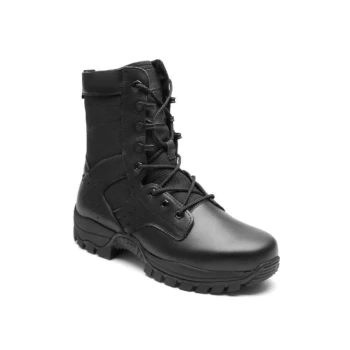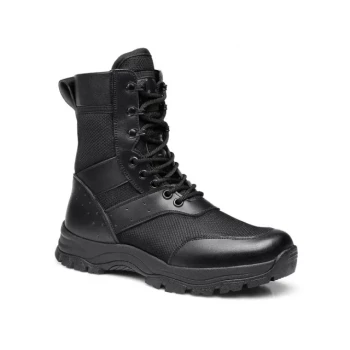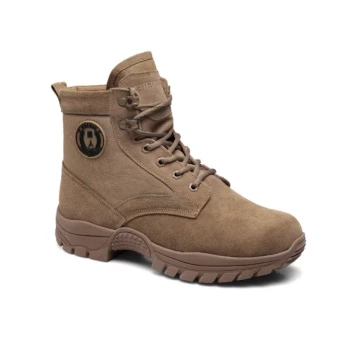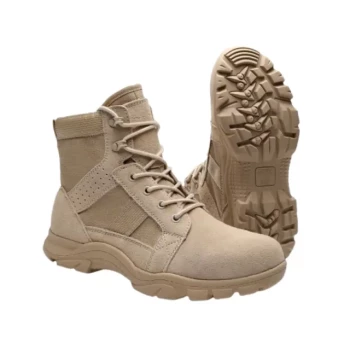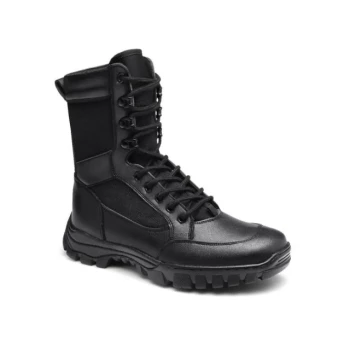The fundamental difference between all-leather and Cordura-leather hybrid boots lies in a direct trade-off between traditional durability and modern lightweight performance. All-leather boots prioritize maximum support and ruggedness, using fewer seams for a more robust construction. In contrast, hybrid boots strategically replace sections of leather with Cordura fabric panels to reduce weight and increase breathability.
Your choice isn't about which boot is universally "better," but about which set of compromises best aligns with your specific environment and activity. You are choosing between the unwavering structural integrity of leather and the lightweight agility of a hybrid.
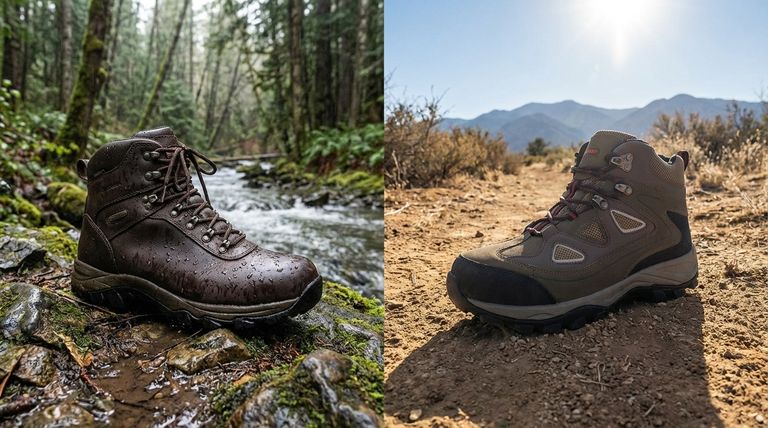
The Case for All-Leather Boots
All-leather boots have been the standard for demanding outdoor use for generations, built on a reputation for toughness and reliability. Their design philosophy prioritizes protection and longevity above all else.
Unmatched Durability and Support
Full-grain leather provides exceptional abrasion resistance against rocks, brush, and ice. More importantly, it offers superior torsional rigidity, giving your ankle and foot consistent support when carrying heavy loads or traversing uneven, off-trail terrain.
Fewer Points of Failure
A key structural advantage of many all-leather boots is their construction from fewer, larger pieces of leather. This results in fewer seams, which are historically the weakest points on any boot and the most common location for stitching to fail or water to penetrate.
Consistent Performance When Wet
While no boot is immune to getting soaked, leather maintains its structural shape and supportive qualities far better than fabric when saturated. This means your ankle support won't degrade significantly during a prolonged river crossing or a multi-day trek in the rain.
The Advantage of Cordura-Leather Hybrids
Hybrid boots represent a modern approach, acknowledging that for many users, reducing fatigue and improving comfort is as important as absolute durability. They are engineered for speed and efficiency.
Significant Weight Reduction
The most immediate benefit of a hybrid boot is the reduced weight. By substituting dense leather with lightweight Cordura fabric, manufacturers can shed critical ounces. Over a long day of hiking, this translates directly to less energy expended and reduced leg fatigue.
Enhanced Breathability
Cordura panels allow heat and water vapor (sweat) to escape far more effectively than a solid leather hide. This increased breathability is a major advantage in hot, dry climates, helping to keep your feet cooler and reduce the risk of blisters.
Faster Drying Time
When a hybrid boot does get wet, the synthetic Cordura fabric does not absorb as much water as leather and will dry significantly faster. With proper airflow, a damp hybrid can be ready for use much sooner than a saturated all-leather boot.
Understanding the Trade-offs
Neither design is perfect. To make an informed choice, you must understand the inherent compromises of each material and construction method.
The Durability Compromise
While Cordura is a highly durable fabric, it is simply not as resistant to long-term abrasion as a quality piece of full-grain leather. The increased number of seams where the fabric meets the leather also introduces more potential points for future failure.
Performance When Wet
The very properties that make a hybrid boot breathable and quick-drying are a liability when it becomes saturated. The fabric panels can become limp and lose their structure, causing the boot to feel less supportive around the ankle just when you need it most in slippery conditions.
The Break-in Period
All-leather boots famously require a break-in period to mold to the shape of your foot, which can be uncomfortable initially. Hybrid boots, with their flexible fabric panels, are often comfortable right out of the box with little to no break-in required.
Making the Right Choice for Your Goal
Your decision should be driven by the terrain, climate, and loads you anticipate.
- If your primary focus is maximum durability and support for heavy packs or off-trail navigation: Choose an all-leather boot for its structural integrity and resistance to abuse.
- If your primary focus is lightweight performance and comfort for established trails in moderate weather: A Cordura-leather hybrid offers a compelling balance of reduced weight and out-of-the-box comfort.
- If your primary focus is travel through consistently wet, boggy, or snowy environments: Lean towards an all-leather boot that will retain its supportive structure even when saturated.
- If your primary focus is hiking in hot, dry climates where ventilation is critical: The superior breathability of a Cordura-leather hybrid is the clear advantage.
Ultimately, choosing the right boot is about selecting the right tool for your specific mission.
Summary Table:
| Feature | All-Leather Boots | Cordura-Leather Hybrid Boots |
|---|---|---|
| Primary Advantage | Maximum durability & support | Lightweight & breathability |
| Weight | Heavier | Lighter |
| Breathability | Lower | Higher |
| Drying Time | Slower | Faster |
| Break-in Period | Required | Minimal to none |
| Best For | Heavy loads, off-trail, wet conditions | Established trails, speed, hot/dry climates |
Need High-Performance Boots for Your Business?
As a large-scale manufacturer, 3515 produces a comprehensive range of all-leather and Cordura-leather hybrid boots for distributors, brand owners, and bulk clients. We deliver the perfect balance of durability, comfort, and performance your customers demand.
Let's discuss your specific needs: Contact our expert team today to explore our production capabilities and get a quote.
Visual Guide
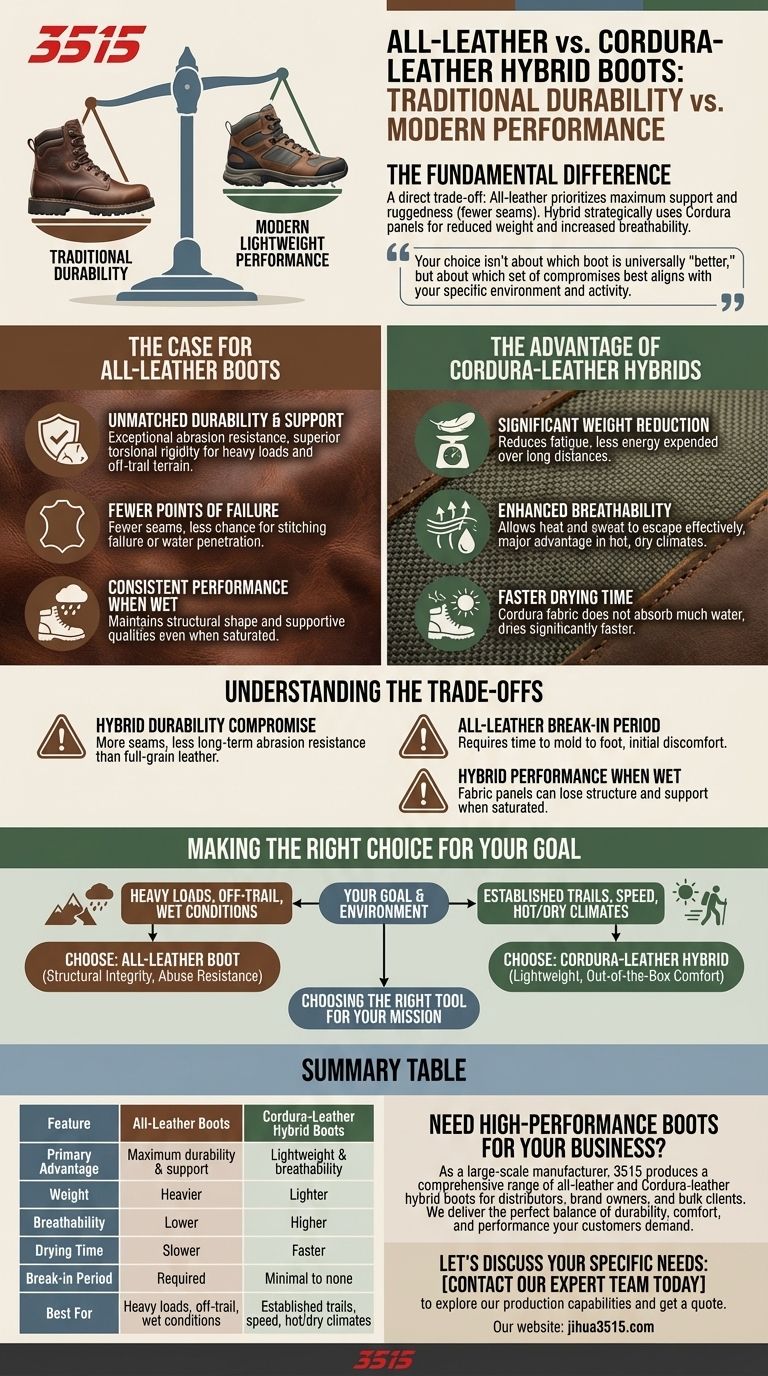
Related Products
- Safety Footwear Wholesale Manufacturer for Custom OEM/ODM Production
- Durable Leather Tactical Boots Wholesale & Custom Manufacturing for Brands
- Wholesale Leather Work Boots with Customizable Wedge Sole for Brands
- Durable Leather High-Ankle Tactical Boots for Wholesale & Custom Manufacturing
- Durable Leather Work Boots Wholesale Manufacturer & Custom Factory
People Also Ask
- How does breathability impact the comfort of tactical boots? The Key to Cool, Dry Feet
- What are the structural advantages of durable tactical boots? Elevate Performance in Rugged & Non-Standard Terrains
- What comfort features should be looked for in tactical boots? Maximize Performance and Reduce Fatigue
- What makes tactical boots valuable for specialized use? Essential Protection & Performance for High-Stakes Roles
- What are the characteristics of tactical shoe midsoles? Find the Perfect Balance of Support & Durability
- How do law enforcement officers benefit from tactical boots? Enhance Safety & Performance
- Why is the anatomical alignment of safety and tactical boots important? Protect the Medial Calcaneal Tubercle Effectively
- How have tactical work boots evolved beyond military use? Essential Gear for Professionals & Outdoor Enthusiasts

